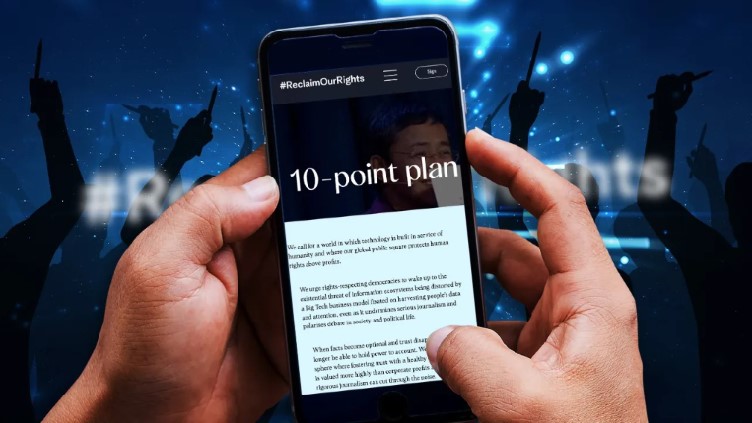
Maria Ressa, Filipino Nobel laureate and esteemed press freedom advocate, will take center stage at the Nobel Prize Summit on Truth, Trust, and Hope tonight to present an ambitious 10-point plan aimed at taming Big Tech and rejuvenating the landscape of journalism.
Ressa, who is the founder and CEO of Rappler news organization in the Philippines, will stand alongside 275 eminent Nobel laureates, journalists, climate and human rights activists, and experts to emphasize the pressing need for action.
The plan to confront the growing information crisis was crafted by Maria Ressa and fellow 2021 Nobel Peace Prize laureate Dmitry Muratov. It has been gathering momentum across a wide range of movements, including human rights, climate justice, and journalism. Since its initiation at the Nobel Peace Center in Oslo last year, the plan has received the endorsement of hundreds of individuals and organizations, including notable climate activists Bill McKibben and Laurence Tubiana, renowned authors Timothy Synder and Moises Naim, and acclaimed film directors Mike Lerner and Asif Kapadia.
During the Nobel Prize Summit, co-hosted by the Nobel Foundation and National Academy of Sciences, Maria Ressa who was appointed last year to be part of the United Nations Internet Governance Forum will spotlight the urgent need to counteract mis- and disinformation that threatens democracy, prevent online harms, and work towards reinstating trust in science. The summit convenes in a time of heightened concern about the possible perils posed by rapid advancements in artificial intelligence (AI).
Speaking about the plan, Maria Ressa stated: “Democracy, freedom, and peace are under threat from hate and lies online. This 10-point plan outlines the systemic changes that rights-respecting governments should take to counter the threat posed by Big Tech’s business model, including protecting citizens’ rights to privacy, and rebuilding independent journalism as the antidote to tyranny.”
The plan has received endorsements from 276 signatories comprising journalists, Members of Parliament from Asia and Europe, tech whistleblowers, human rights activists, and over 140 non-governmental organizations.
Prominent backers include tech whistleblowers Frances Haugen and Aerica Shimizu Banks; human rights and environmental activists Kumi Naidoo and Esmerelda de Belgique; three UN special rapporteurs; and a plethora of non-governmental organizations, including Avaaz, Human Rights Watch, and Transparency International EU.
Named ‘People vs Big Tech’, this plan comes as a response to growing concerns about Big Tech-driven harms, offering potential solutions and emphasizing the urgent need for action. It is a potent advocacy tool, designed to inform legislators and policymakers and mobilize citizens around the world. It also underscores the widespread concern about Big Tech’s influence, offers widely accepted solutions, and underlines the urgency of action.
As Maria Ressa takes the stage at the Nobel Prize Summit tonight, the world watches, awaiting the ripple effect her 10-point plan may have on Big Tech and journalism alike.
Filipino @NobelPrize Laureate @mariaressa will be presenting a 10 Point Plan to Address the Information Crisis, specifically to Rein In Big Tech from Harming Humans and Rebuild Journalism tonight at 9:30 pm PST #ReclaimOurRights #PressFreedom https://t.co/HnR86xZ9MQ
— Angie Quadra-Balibay (@AngieQBalibay) May 24, 2023
Following are the 10 Points to be presented by Maria Ressa:
We, as Nobel Laureates, from across the world, send a united message: together we can end this corporate and technological assault on our lives and liberties, but we must act now. It is time to implement the solutions we already have to rebuild journalism and reclaim the technological architecture of global conversation for all humanity.
We call on all rights-respecting democratic governments to:
- Require tech companies to carry out independent human rights impact assessments that must be made public as well as demand transparency on all aspects of their business – from content moderation to algorithm impacts to data processing to integrity policies.
- Protect citizens’ right to privacy with robust data protection laws.
- Publicly condemn abuses against the free press and journalists globally and commit funding and assistance to independent media and journalists under attack. We call on the EU to:
- Be ambitious in enforcing the Digital Services and Digital Markets Acts so these laws amount to more than just ‘new paperwork’ for the companies and instead force them to make changes to their business model, such as ending algorithmic amplification that threatens fundamental rights and spreads disinformation and hate, including in cases where the risks originate outside EU borders.
- Urgently propose legislation to ban surveillance advertising, recognizing this practice is fundamentally incompatible with human rights.
- Properly enforce the EU General Data Protection Regulation so that people’s data rights are finally made reality.
- Include strong safeguards for journalists’ safety, media sustainability and democratic guarantees in the digital space in the forthcoming European Media Freedom Act.
- Protect media freedom by cutting off disinformation upstream. This means there should be no special exemptions or carve-outs for any organisation or individual in any new technology or media legislation. With globalised information flows, this would give a blank check to those governments and non-state actors who produce industrial scale disinformation to harm democracies and polarise societies everywhere.
- Challenge the extraordinary lobbying machinery, the astroturfing campaigns and recruitment revolving door between big tech companies and European government institutions.
We call on the UN to:
10. Create a special Envoy of the UN Secretary-General focused on the Safety of Journalists (SESJ) who would challenge the current status quo and finally raise the cost of crimes against journalists.
Signed by: Dimitry Muratov, 2021 Nobel Peace Prize laureate Maria Ressa, 2021 Nobel Peace Prize laureate
SHARE THIS and WATCH Maria Ressa present the full 10-Point Plan tonight, May 24, 9:30 PM Philippine Standard Time (9:30 AM Washington D.C.):
Good News Pilipinas is a Lasallian Scholarum Awardee. TELL US your good news story tips by messaging GoodNewsPilipinas.com on Facebook, Twitter, Instagram, or e-mail editor@goodnewspilipinas.com and WATCH Good News Pilipinas TV YouTube & Good News Pilipinas TikTok for more Filipino Pride stories!










